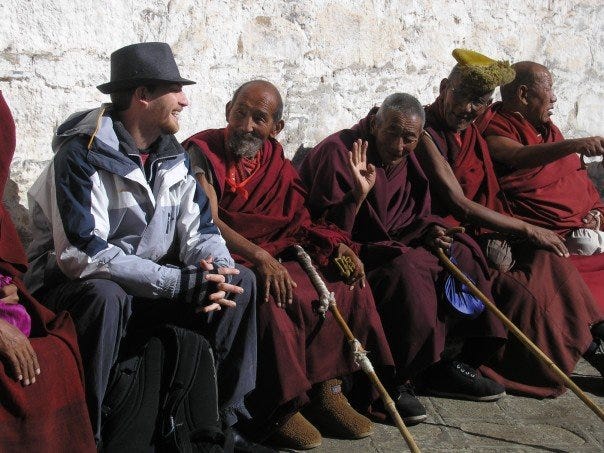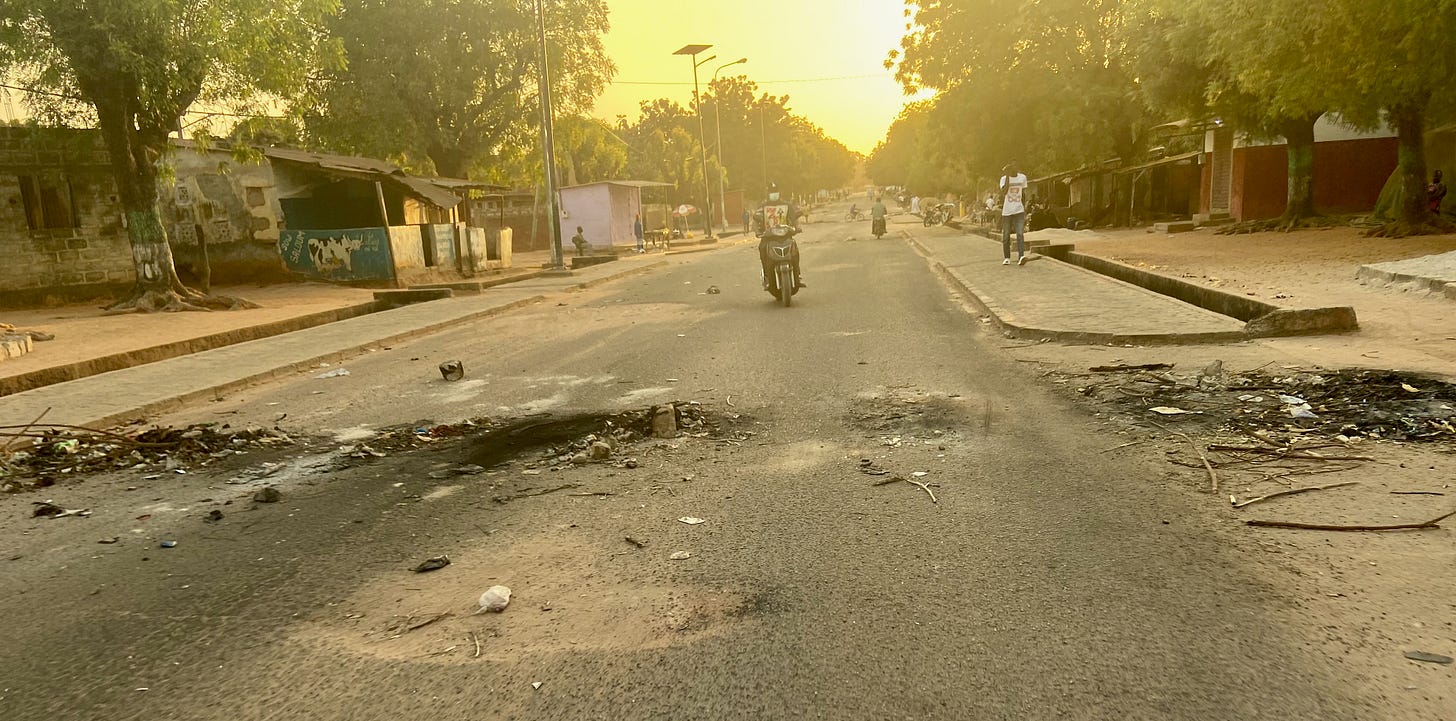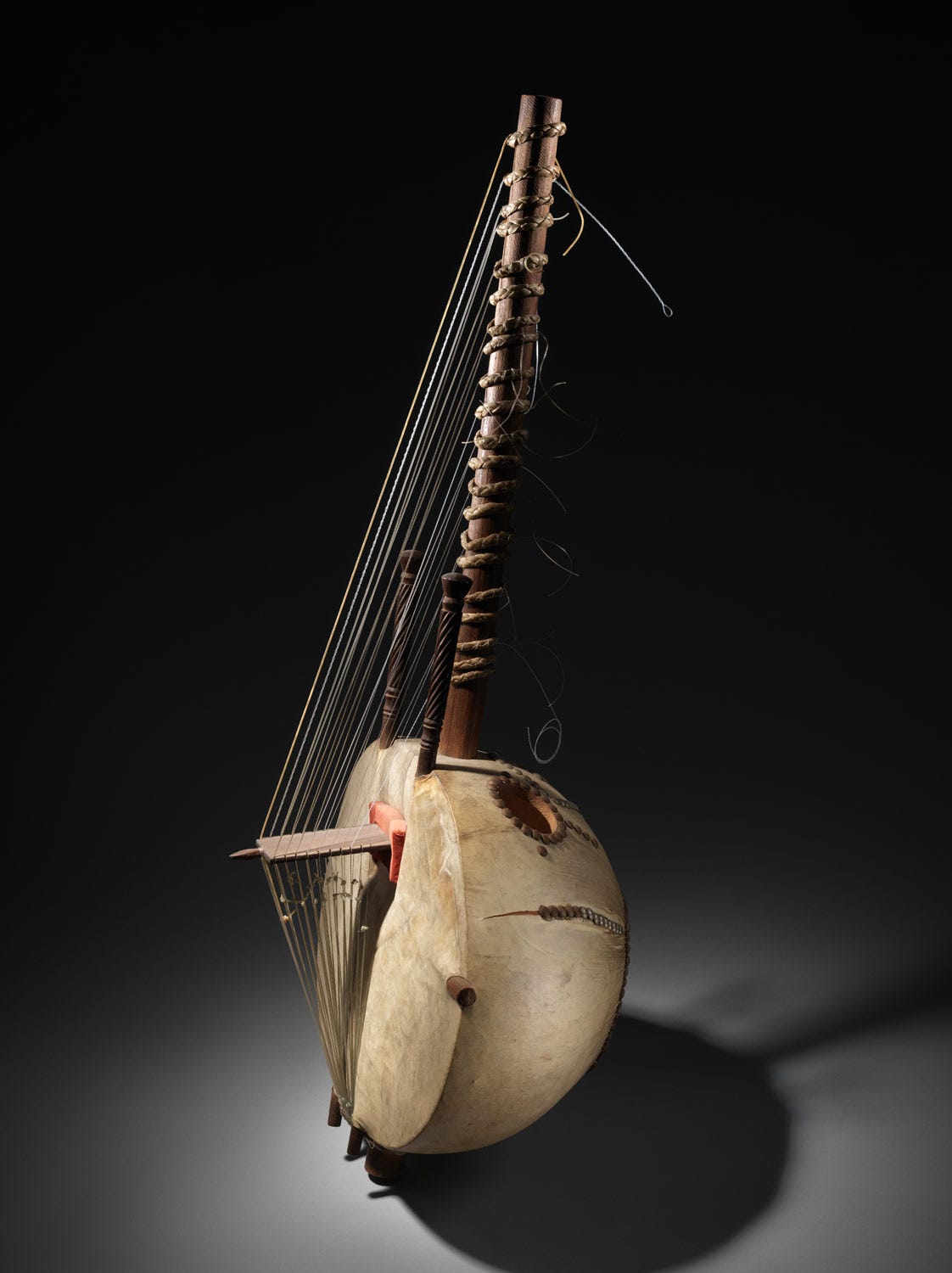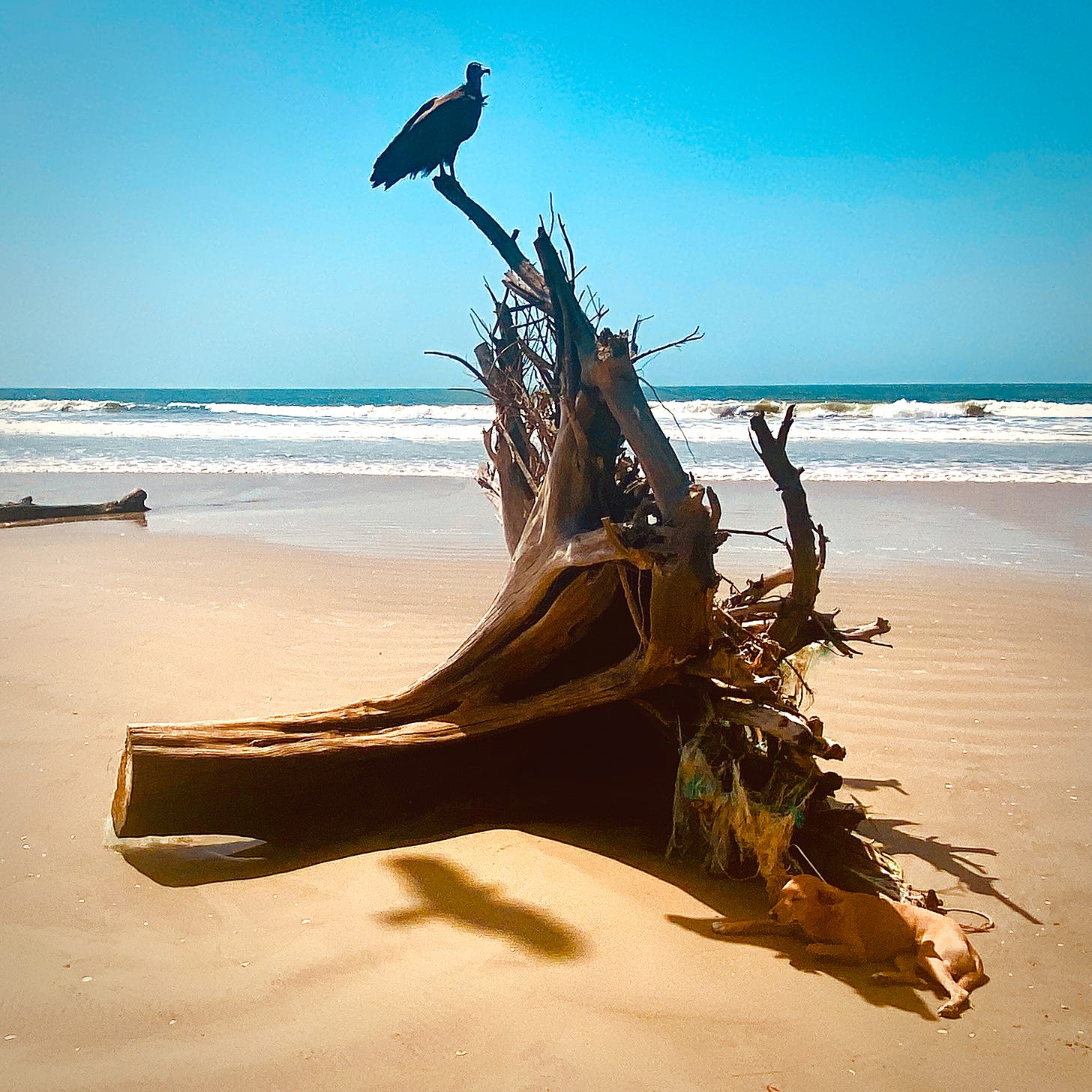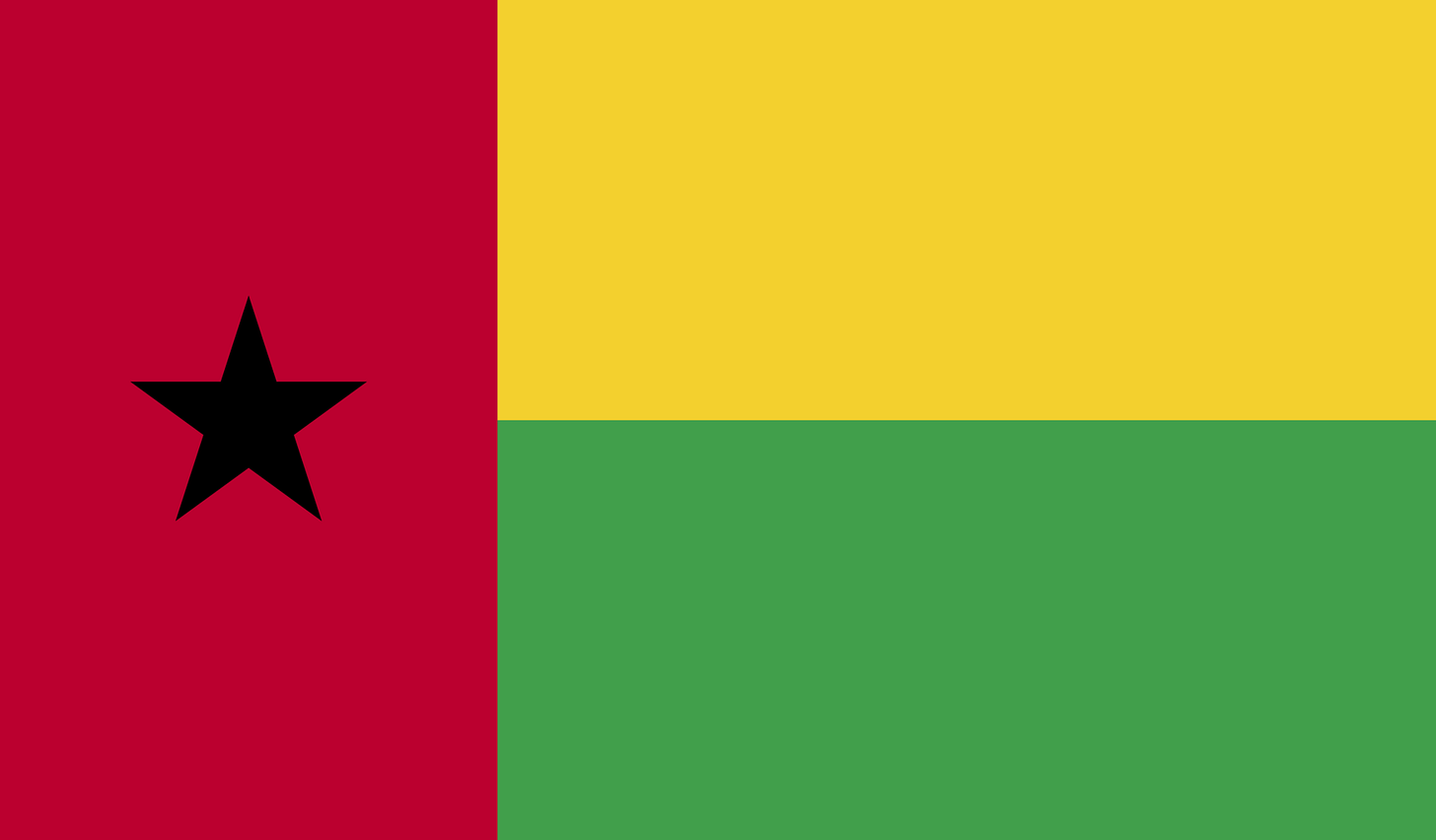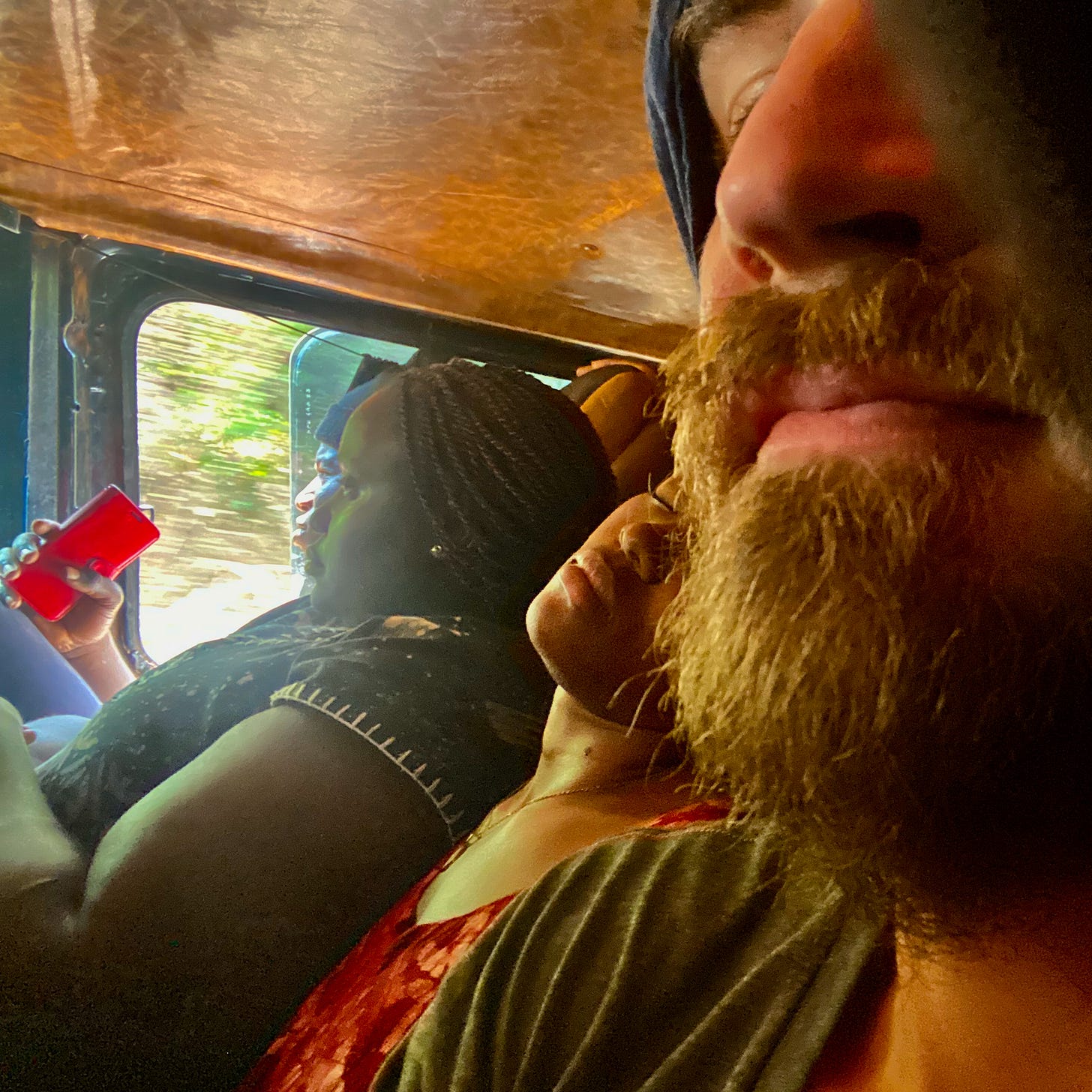Crossing Southern Senegal
Burning Tires, Pristine Beaches and a Davidic Harp (African style)
TL;DR: I spent one week crossing southern Senegal on my way to Guinea-Bissau.
After spending a few peaceful days with Mariama Toubab at a quiet getaway on the coast of Senegal, I departed alone and made my way south towards Guinea-Bissau.
I came to The Gambia for three specific reasons, knowing that the third reason would tell me where to go next. And so, from the moment I first met Mariama Toubab (reason 3 of 3), my ears were tuned to her voice. Where would she tell me to go?
The answer to my question became overwhelmingly clear after spending only a few days together in the outskirts of Abéné. She repeatedly mentioned a region in Guinea that she’d always wanted to visit: Fouta Djallon.
When I looked the destination up, I discovered many refer to these highlands as the “Tibet of West Africa” due to the high altitude (relative to the rest of West Africa) and the high concentration of religious zealots. In Guinea’s case, the religion is Islam as opposed to the Mahayana Buddhism of Tibet.
In 2007, I spent a few frigid days in Tibet during a Southeast Asia Study Tour just before completing my final semester of university in Western Australia. Over the following decade—especially as I traveled throughout Asia—my previous experiences in Tibet shaped my journey.
Would the same life impact come from visiting Fouta Djallon?
Only one way to know: go!
So, as soon as I had clarity about my destination, I packed my backpack and headed out. The driver who brought me from Gambia to Senegal made a few phone calls before I left and, before I knew it, a personal concierge was scheduled to pick me up from the bus stop in Ziguinchor.
Ziguinchor, Senegal
Yassin showed up pushing his motorbike. First stop: the petrol station as he was low on “essence”. Once I filled his tank, we were off. I held tightly to the sides of the bike as we sped through smoldering city streets. The pungent aroma of burnt rubber tires filled my nostrils as we navigated heaps of black debris at each crossroad, still smoking from the previous night’s riot.
Did I mention Senegal is a French speaking country? And, as you might expect in a country of French influence, when trying to get the government’s attention, you light tires on fire in the street.
This protest technique was squashed the night before I arrived, however, when the police shot and killed two rioters. The sting of defeat was still in the air as we cruised the streets, and Yassin explained the current political situation in Senegal. The sitting President decided to suspend the election, and the people were less than thrilled with that idea. As a result of the protests in cities across Senegal, he quickly reinstated a new election date in late March.
After a tour of the city and some delectable street food, we decided to call it a night. Just before Yassin dropped me off at my hotel, he doubled back and pulled up in front of two well dressed men walking in the cool of the evening. They chatted for a moment in French before inviting me to join them at their home.
Who were these two stately men?
The most famous Kora players in Senegal, of course!
The West African Kora
The Kora is a long-necked harp lute native to West Africa. This stringed instrument is composed of a large calabash gourd that serves as a resonator covered by a goat leather soundboard. Passing through the gourd is a long hardwood neck with twenty-one strings. Traditionally these strings are also made of leather, but Sadio’s custom Kora uses nylon fishing strings attached to the top of the neck with pegs designed for a concert cello. Each string passes over a notched bridge (10 strings on one side of the bridge and 11 on the other) and are skillfully plucked with the thumb and forefinger of each hand.
Native to the Gambia River valley, the origins of the kora are obscure. History does confirm, however, that this instrument is classically associated with royalty and the ruling classes. Until recently, all kora players were men from the Malinke family. Sadio’s family has been playing and teaching Kora for generations. As I stepped into the parlor of Sadio’s home, I knew I was in the presence of greatness.
It was clear that the entire family respected his profession. He’s traveled extensively, playing Kora for dignitaries all over the world, most recently while living in Oxford. In 2005 I studied at University College (the oldest college at Oxford University), so we swapped stories of High Street for a bit before his wife brought a large black case into the living room and placed it before him.
Sadio removed the instrument with great care and plucked a few strings to ensure tuning before ripping into a series of West African folk songs. I sat back on the couch, closed my eyes and imagined what it would have been like during the time of King David at the Temple in Jerusalem.
Surely, this unique instrument will be added to the Tabernacle of David when it is time for the restoration of the Temple written about in Amos 9:11.
These were literally my thoughts as Sadio’s youngest boy came and nestled in on the couch beside me. As the melodic harmonies floated through the crisp evening air, he drifted off to sleep with his head in my lap. It was beautiful, and I felt the treasure of the moment. The present is a gift.
Music is a passion.
One of my favorite ways of creating music is the flute. I’m currently traveling with four bansuri flutes in my main pack, but I also keep a carbon fiber flute in my day pack (Thanks Erik!). When invited into the home of a musician for a late night jam session, however, you bring them all. As the night shifted from traditional folk songs to a melodic free flow, I pulled out the two largest flutes I travel with (both in the Key of D) and joined in the fun.
One of these two larger flutes has an obscure Middle Eastern tuning, and I cannot help but imagine Yeshua walking the streets of Jerusalem anytime I play it. In fact, anytime I play this flute, it is worship. After an intimate session of flute and lute, we came to a natural break and Sadio took note of our special moment.
It’s times like these that doors seemingly open in an unseen realm, and I am able to speak directly to someone’s spirit. Come into alignment with the Kingdom!
Sadio, like most men in Senegal, is a devout Muslim. Music, however, has the unique ability to pierce through cultural divides and bridge a conversation. I am continually amazed when sharing my faith with Muslims how eager they are to hear my perspective, especially when they realize that I’ve actually read the Quran. My conversation with Sadio and Yassin made my beliefs clear; I respect the devotion of Muslims, despite vehemently disagreeing with their antichrist teachings.
Sadio ignored my attack on Islam and told me that when I was singing he felt the presence of God in his home. Little did he know that I was singing The Shema over his masterful Kora plucking. These Hebrew words of worship give praise where it is due, to the One true and living God.
"Hear, O Israel: YHVH is our God, YHVH is one"
Hebrew: שְׁמַע יִשְׂרָאֵל יְהוָה אֱלֹהֵינוּ יְהוָה אֶחָֽד׃
Deuteronomy 6:4
Eventually, the Sadio’s wife scooped her son from my lap and carried him off to bed. We continued singing and sharing. Between songs we discussed travels and the beauty of Senegal. When I mentioned that I would be leaving Senegal in the morning (en route to Fouta Djallon by way of Guinea-Bissau), he put a halt to the conversation. “You cannot leave Senegal without seeing Cap Skirring.”
This is a name I had heard mentioned a few times. And so, based on his insistence, I decided to take a short detour in the morning and visit the celebrated white sand beach that Casamance is known for. After all, I would be spending the next few days finalizing a project for Simka Foundation and simply needed a location with a reliable internet connection. Guinea-Bissau is known for internet outages, so I opted for the white sand beaches instead.
Cap Skirring
I woke up rested, found a pastry shop (because French cuisine is delicious), and boarded a van at the nearby bus station. There’s no schedule for public transport. Instead, when a bus is ready to go, the driver starts shouting the name of the final destination and it slowly fills up. “Cap Skirring! Cap! Cap! Cap! Cap Skirring!”
It doesn’t leave until all seats are paid for. Sometimes, this is a quick matter. At other times, like this morning, it can take several hours to fill the seats. Eventually, however, we did depart and 30 minutes later I found myself in a small beachside town filled with European tourists. While I typically avoid locations like this in my travels, I knew the proliferation of tourists meant decent internet.
Sadio had arranged for his cousin to pick me up and take me to a private beachside resort just outside of town. And, just like that, I instantly became the only tourist in an obscure resort on a private beach with reasonably fast WiFi. I posted up and began to edit the Shabbat Guide.
For four days, this beach was my office.
All day, I would work tirelessly on final edits of a year-long passion project, relax in my hammock, eat delicious Senegalese cuisine, and sleep under the safety of an oversized mosquito net. Rinse. Repeat. I only left the private compound once in those four short days. I was on a time crunch and—in this remote location—I had everything necessary to accomplish the task at hand.
Mission complete.
The Shabbat Guide walks you through a year on the biblical calendar and encourages weekly conversation around the dinner table. I’m proud to announce that this labor of love is now printed, in stock and available for sale on a site I built. (Check out the site. What do you think?) If you’ve ever wondered what I do with all my spare time, I absolutely love creating and designing! This is especially rewarding when working with world-class biblical scholars…
Show Simka Foundation some love.
Order your very own copy of the Shabbat Guide.
I had initially only planned to spend a day in Cap, so I was not packing adequate cash to linger longer. My funds dwindled, and I was forced to leave this quiet beachside retreat and head back to Ziguinchor (as no ATMs were functioning in Cap Skirring).
A Quick Visa
Back in Ziguinchor, I was now intent on venturing on to Fouta Djallon. I went back to the same bus terminal where I found the van to the beachside. In the midst of drivers yelling various towns and cities, I find a seven-seater van to “Bissau”.
As I’m waiting for our pending departure, a young boy struck up a conversation with me. When he asked about my visa to enter Guinea-Bissau, I explained that I did not have one yet, but that I read it was possible to get one at the border.
Suddenly, concern filled his face.
In his broken English he explained that the visa fee at the border was CFA 50,000 (~$80) and the fee at the local embassy in Ziguinchor was only CFA 20,000 (~$30). Given the choice, I obviously opted for the least expensive version and quickly found myself leaving the loaded van.
My new guide led me through a zig zag maze to a nondescript building on a side street flying a lone flag from Guinea-Bissau.
Today’s Fun Fact:
The flag of Guinea-Bissau looks identical to the flag of Texas.
Just swap the red, white and blue for a rasta vibe.
As it was a Sunday, the embassy was closed. Nevertheless, some strangers in the street made a few phone calls and within minutes a man appeared in a dinged up SUV, unlocked the gate, and welcomed me in.
As an American, I do not take for granted the ease of travel, especially concerning visas. This was too easy. I paid the discounted fee for a tourist visa and he took up an entire page in my passport with a new pixelated sticker. He scribbled some details on the sticker and we exchanged pleasantries in Portuguese. I’m excited to move from a French-speaking country (where I have difficulty communicating verbally) to a country that speaks a language I understand.
I gave the boy a hefty tip for saving me $50. We shared a pastry before heading back to the bus terminal were he located another van just about to pull away. I filled the last seat on our row of four (meant for 3) and squeezed in next to an open window.
Guinea-Bissau will be my next adventure! Stay tuned.
It’s an honor to have you with me on this JOURNEY.
I pray that the testimonies from my adventures will bless you and encourage you in your own faith walk. The single biggest thing you can do to support me is to subscribe to the AL3XAND3R update and share it with your friends. I’m Gr8ful.
Most importantly today:
The OIC is two weeks away!
Consider supporting financially.



